Vogue’s former senior fashion editor, 73-year-old Vera Wang once said, the secret to looking good is “work, sleep, a vodka cocktail, and not much sun”. If you haven’t gotten the memo, you need to wear sunscreen every day. Whether you’re indoors or outdoors, the mighty sunscreen can protect your skin, avoid premature ageing, and prevent skin cancer. However, not all sunscreens are created equal and it can be tricky to choose the right one when you’re shopping for one. Here, we round up the different types of sunscreen to clear up common sunscreen confusion.
Here Are The Different Types Of Sunscreen You Need To Beat The Blazing Heat
While we’re constantly reminded of the importance of skin protection, people also tend to forget that the type of sunscreen you use is equally crucial. Generally, there are three types of sunscreen—chemical, physical, and hybrid. Let’s have a look at the differences between these sunscreen products.
1. Chemical Sunscreen
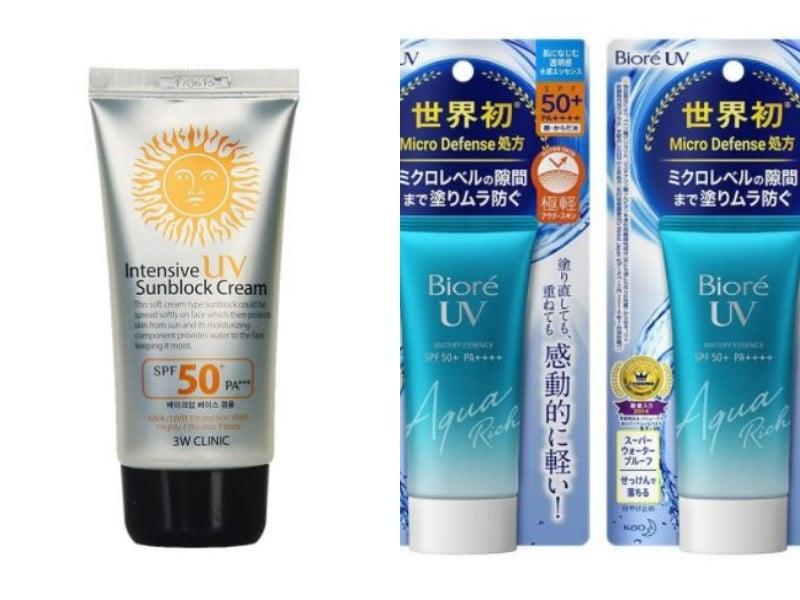
Chemical sunscreens are formulated with active ingredients, but without zinc oxide and titanium dioxide. This is also the reason why it’s called organic sunscreen. It sits on top of the skin, forming a barrier that converts UV light into heat, which are then released from the body, for maximum sun protection.
A chemical sunscreen’s lightweight formula also makes it easy to be mixed with makeup and other skincare products, thus making it one of the best sunscreens for the face. So, if you’re a makeup junkie who can’t live a day without a full face of makeup on, this is your best bet. Also, this type of sunscreen provides the best protection for the body if you’re active, sweat, and swim a lot during the day as it’s waterproof. No matter how many times you jump into the pool, it never comes off.
Best chemical sunscreen that shields against UV:
- 3W Clinic Intensive UV Sunblock Cream SPF50+ PA+++
- Bioré UV Aqua Rich Watery Essence Sunscreen SPF50
- Beauty Of Joseon Relief Sun: Rice + Probiotics SPF50+
2. Physical Sunscreen
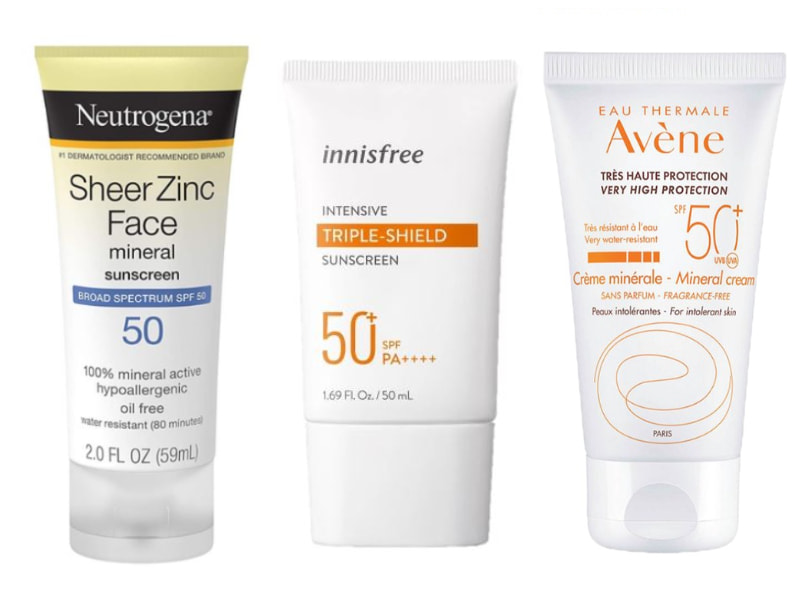
Physical sunscreen is also known as a natural sunscreen (inorganic) or mineral sunscreen due to the fine mineral particles like titanium oxide and zinc oxide in its formulation. It works by reflecting and scattering UV rays as the mineral particles form a protective layer on the surface of the skin. Not just that, physical sunscreen is usually non-comedogenic and perfect for people with sensitive or acne-prone skin. Tan-skinned people can opt for a tinted physical sunscreen as regular ones have a tendency to leave a white cast on the skin.
Best physical sunscreen/mineral sunscreen that shields against UV:
- Neutrogena Sheer Zinc Mineral Sunscreen SPF50
- Eau Thermale Avène Very High Pro Mineral Cream SPF50+
- Innisfree Intensive Triple Shield Sunscreen SPF50+
3. Hybrid Sunscreen
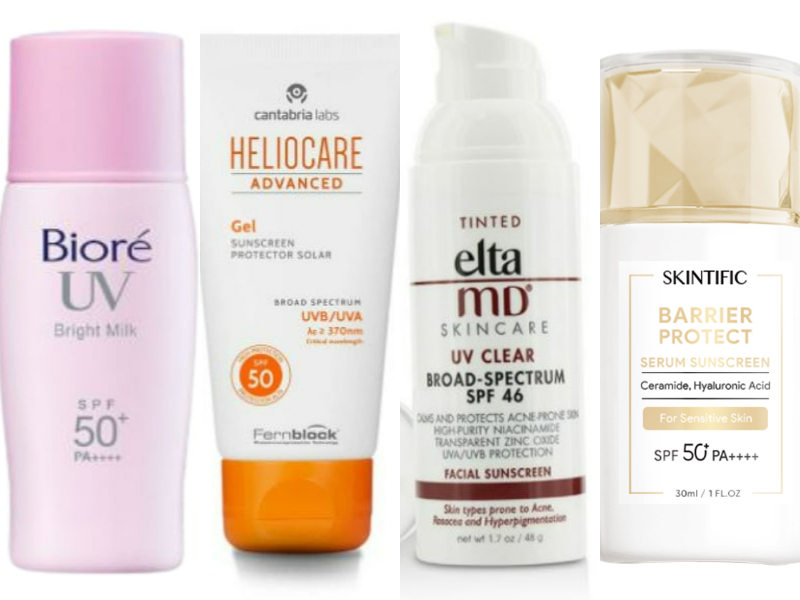
Hybrid sunscreen is another type of sunscreen that may sound new to some people but is widely available on the market. If you’re someone who’s indecisive, set your worries aside. You get to enjoy the best of both worlds with a hybrid sunscreen—the non-irritating formula of a physical sunscreen, plus the lightweight broad-spectrum coverage of a chemical sunscreen!
Best hybrid sunscreen that shields against UV:
- Bioré UV Bright Face Milk SPF50 PA++++
- Heliocare Advanced Gel SPF50
- EltaMD UV Clear Facial Sunscreen SPF46
- SKINTIFIC Barrier Protect Sunscreen SPF50 PA++++
What Is Triple Sunscreen?
A triple sunscreen shields your skin against all three rays—UVA, UVB, and infrared.
Chemical vs Physical Sunscreen: What Do You Need To Know Before Choosing Different Types Of Sunscreen?
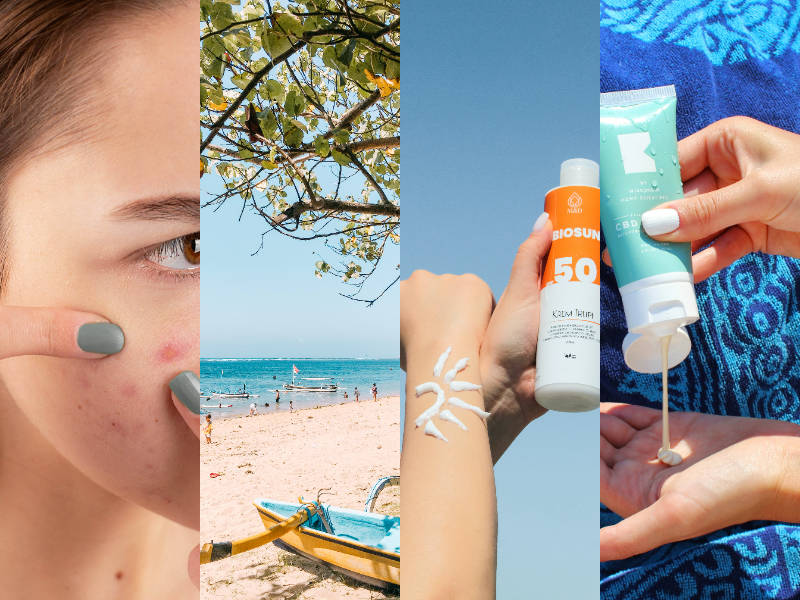
Everybody knows that your skin and sun aren’t best friends. For starters, there are a few non-negotiables you need to take note of regardless of which type of sunscreen you’re getting your hands on. Here are some things to look for on the label when you’re confronted with rows of sunscreen that say “doesn’t sting”, “sweatproof”, “non-toxic”, and “high SPF”.
Check Your Skin Condition
When it comes to sunscreens that won’t cause breakouts and other skin irritations, physical sunscreen is the best option for those with sensitive, oily, or acne-prone skin.
On the other hand, chemical sunscreen is a stellar choice for ladies who prioritise a smooth makeup finish as it spreads easily and absorbs quickly into the skin. After all, it’s a beautyholic’s biggest fear to have foundation running down their face while they’re out and about!
Consider Your Activities
If you’re doing water sports or water-related activities, the mineral sunscreen is great due to its waterproof properties. You’ll want to check how long it stays on the skin by the minutes it claims on the bottle. Under the sun but no water activities involved? The chemical sunscreen should be your go-to. For the best protection, practise reapplying sunscreen every 40 to 80 minutes.
Look For A Broad-Spectrum Sunscreen
There are many types of ray present in sunlight, but the most damaging ones to the skin are UVA rays that cause signs of ageing and UVB rays that cause sunburns. A broad-spectrum sunscreen provides protection against both, and is perhaps the secret to maintaining an age-proof complexion.
At Least SPF30, No Less
More importantly, focus on finding a broad-spectrum sunscreen with at least SPF30. There’s no sunscreen offering 100% skin protection, but with proper SPF30 application, your skin will be protected from about 97% of UVB rays. That’s not bad at all, right? You can even up your skin protection game to SPF50 or 70 if you spend a lot of time outdoors.
Sunscreen vs Sunblock: What’s The Difference?
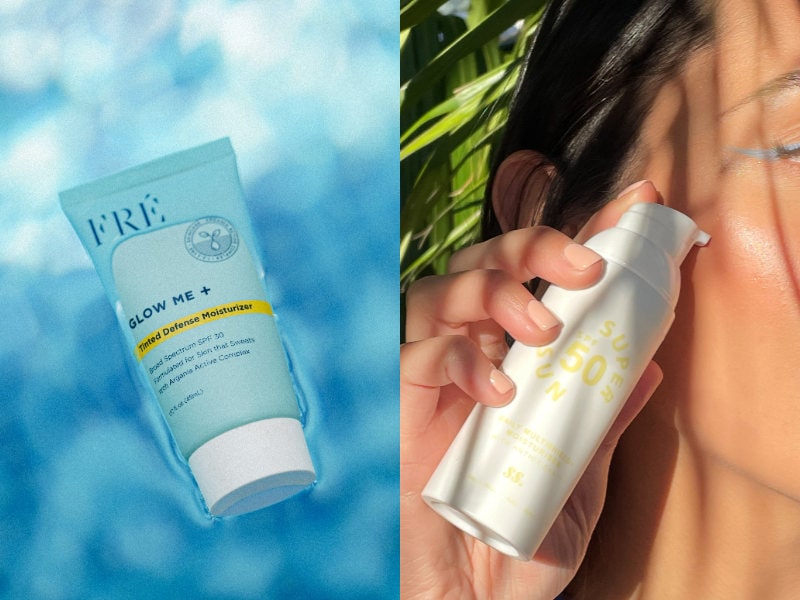
“Sunscreen” and “sunblock” are often used interchangeably, and it can be very confusing when there are too many different types of sunscreen on the shelves. So, let’s decode the sunblock vs sunscreen fine print.
Sunscreen
Sunscreen protects against UVA rays, which cause skin damage like premature ageing. The organic chemical compound in this sunscreen absorbs the sun’s rays and releases the heat before it can penetrate the skin.
Sunblock
Sunblock is pretty self-explanatory. It blocks sun rays by sitting on top of your skin and then reflecting them. It’s also formulated to prevent skin damage caused by UVB rays (sunburn).
Is Sunscreen Or Sunblock Better?
Sunscreen and sunblock are both amazing sun protection lotions. When weighing the pros and cons, you need to understand the way they work, the ingredients, the application, as well as your skin condition.
Pros and cons of sunscreen:
Pros
- They are broad spectrum (protects skin against both UVA and UVB rays)
- Prevent skin from getting red from sunburn
Cons
- Contains chemical ingredients
- May cause irritation or allergic reaction if you have sensitive skin
Pros and cons of sunblock:
Pros
- Great for sensitive skin
- It blocks heat/ray rather than absorbing it
Cons
- Usually doesn’t protect the skin against UVB
At the end of the day, you know what’s best for your skin. As long as your skin protectant does its job, is water-resistant, and non-irritating, you’re good to go all year round. If you prefer sunblock rather than sunscreen, worry not as you can easily find a broad-spectrum sunblock in the market.
Pick The Best Type Of Sunscreen For Your Skin For Maximum Protection
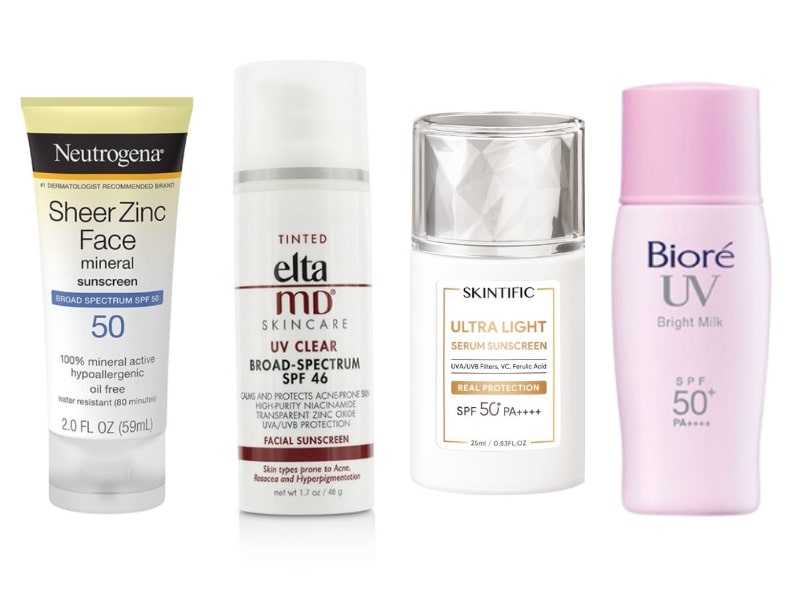
Slip, slop, and slap! Now that you know everything about the different types of sunscreen including the differences between sunscreen and sunblock, it’s time to start your love affair with sunscreen. For the best results, choose the best sunscreens for you according to skin type. You may not see the benefits right away, but in 10 years you’ll be thanking yourself for adding a few drops of that liquid gold into your daily skincare routine. Not sure how to layer your sunscreen? Check out the correct order to apply skincare products to maximise absorption.
